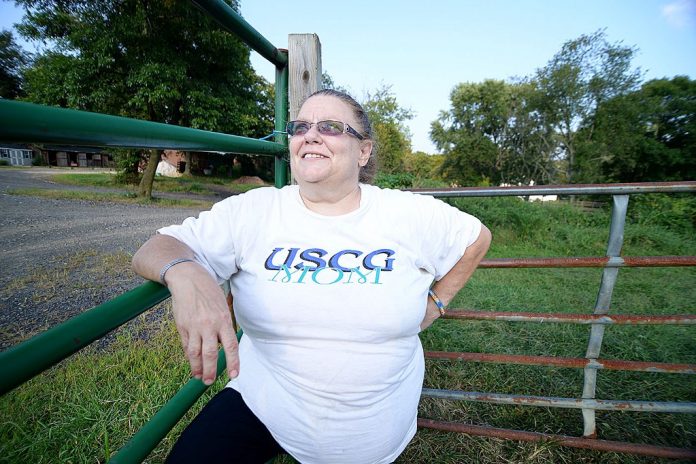Randee Stevens waits for her daughter, 19-year-old Nika, to finish her riding lesson at Parkwood Therapeutic Riding Center. Nika has severe autism. MARIA POUCHNIKOVA / TIMES PHOTO
Those who don’t know Randee Stevens’ daughter, Nika, might think that she doesn’t communicate very well.
The 19-year-old Winchester Park resident has overcome mild mental retardation, severe autism and the after-effects of malnourishment during her early childhood in her native Romania.
She speaks in sounds and gestures, but not words. Yet, she manages to communicate quite well in a conducive environment. In fact, she speaks volumes to the horses she rides in a Northeast-based nonprofit therapeutic program.
Nika is a client of the Parkwood Therapeutic Riding Center, which veteran competitive rider and trainer Sarah Del Ricci founded about a year ago at Black Lake Run Farm in Mechanicsville. Stevens learned of the program last spring after volunteering there as part of a community service project through Home Depot.
Nika has been riding every week since then. She started off with a quarter horse named Rockin P Boston, then recently switched to an aging yet spry pony named Isabella, with whom Nika’s become fast friends.
“With Boston, he puts his ears to the front when you’re coming and he’s always interested in what’s going on. Isabella is more like the grandmom who lets the kids crawl all over her,” Stevens said.
According to Del Ricci, this bond between horse and rider transcends the specific disabilities, or capabilities, of the person involved and grows at a deeper emotional level with equal participation by the horse. The animal senses the strengths and weaknesses of the rider, just as the rider learns to understand the personality and body language of the animal.
“[The horses] totally know what they’re doing. We have horses that, when they see their rider coming, they start looking and batting their eyelashes,” Del Ricci said. “The horses want that validation and approval.”
They also want to be ridden. For example, to a senior citizen like Isabella — who is “pushing 30” years old — the activity gives her a purpose and much-needed exercise.
The riding program acquired her at auction in June, rescuing her from almost certain slaughter. Since then, she’s been eating well, adding weight and looking a lot healthier.
Meanwhile, Nika is making a lot of progress, too. Del Ricci and her mostly volunteer staff are not licensed therapists, but they don’t claim or need to be.
“It’s not physical therapy. It’s more like social therapy,” Stevens said. “It’s learning to take turns, follow directions, follow rules and how to control a large animal.”
Like most clients, Nika spends about one hour a week at the riding center. Her first duty is to help groom and saddle the horse. Rides can take place in a large fenced area and on the trails of the nearby city and state parks. There are no public streets in the area. After the ride, clients must help groom the animal again. They can feed snacks such as baby carrots to the horses.
“Part of this experience goes home,” Stevens said. “When we’re shopping, Nika has to remember to buy carrots and when we get home, she has to cut them into chunks to bring here. If she forgets to buy them, I tell her she’s got to remember the carrots. That makes her grow up a little bit.”
During a recent session, Nika seemed a bit reluctant to mount Isabella at first, but after a few steps she was holding the reins and directing the horse without hands-on assistance from Del Ricci. And Nika emerged with an obvious sense of pride.
“With kids like her, everything is dictated to them. But when they get a sense of control of their own life, it’s confidence building,” Stevens said.
In Nika’s case, the socialization has helped her reacclimate to her school after the long summer break and helped her mom sleep better at night.
“After [riding], she’s ready to go home, take a bath, eat and get ready for bed,” Stevens said.
Similar lessons can apply to a wide range of clients including children and adults with mental, physical or emotional challenges. According to Del Ricci, horses have been serving people that way since ancient Greece. Del Ricci is a certified instructor with the Professional Association of Therapeutic Horsemanship International.
“The cool thing about therapeutic riding is we don’t say, ‘If you have seizures, you can’t ride,’ or, ‘If you only have one arm, you can’t ride,’ ” Del Ricci said. “We can’t do [therapeutic] manipulations or psych-therapy. But what we can do is teach a riding skill that can translate into a life skill.
“We work with people who have physical disabilities, mental disabilities, people who are in rehabilitation, who have had strokes or car accidents. As long as the rider’s physician doesn’t give a contraindication.”
It’s not free. The center charges $45 per session with proceeds helping to keep the program going. Scholarships are available based on need and suitability for the program. The center also offers riding lessons to people without special needs. It operates year-round.
“No matter if it’s raining, it’s seven degrees or 107 degrees, we have parents calling to say, ‘Don’t cancel,’ ” Del Ricci said. ••
Contact the Parkwood Therapeutic Riding Center at 215–715–6123 or visit www.parkwoodtrc.com.
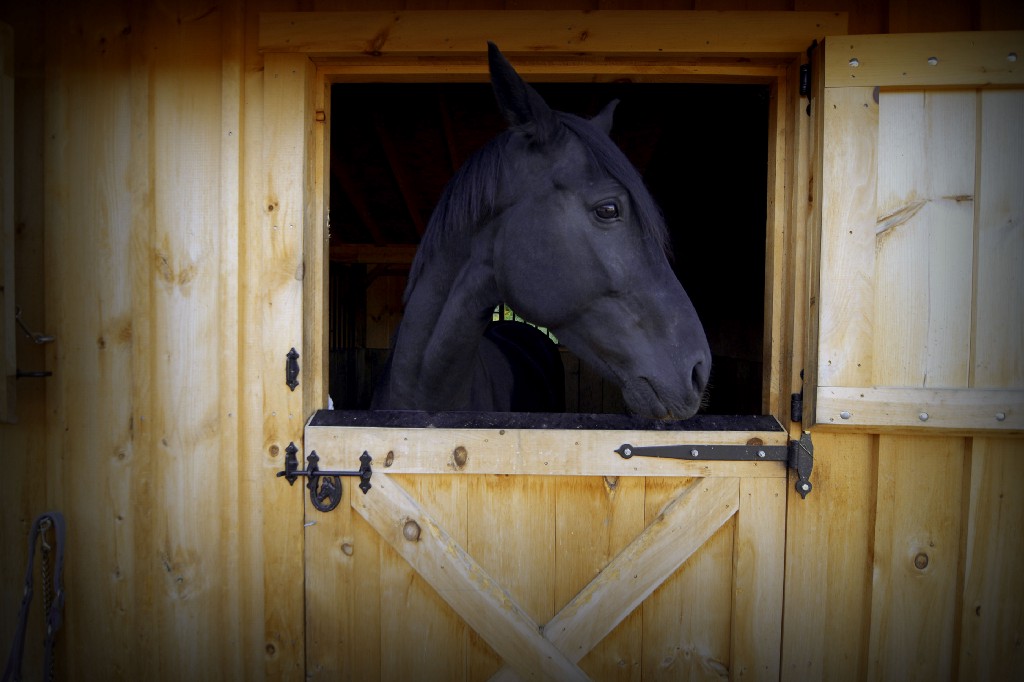
One of the horses at the program peeks out of the barn window. MARIA POUCHNIKOVA / TIMES PHOTO
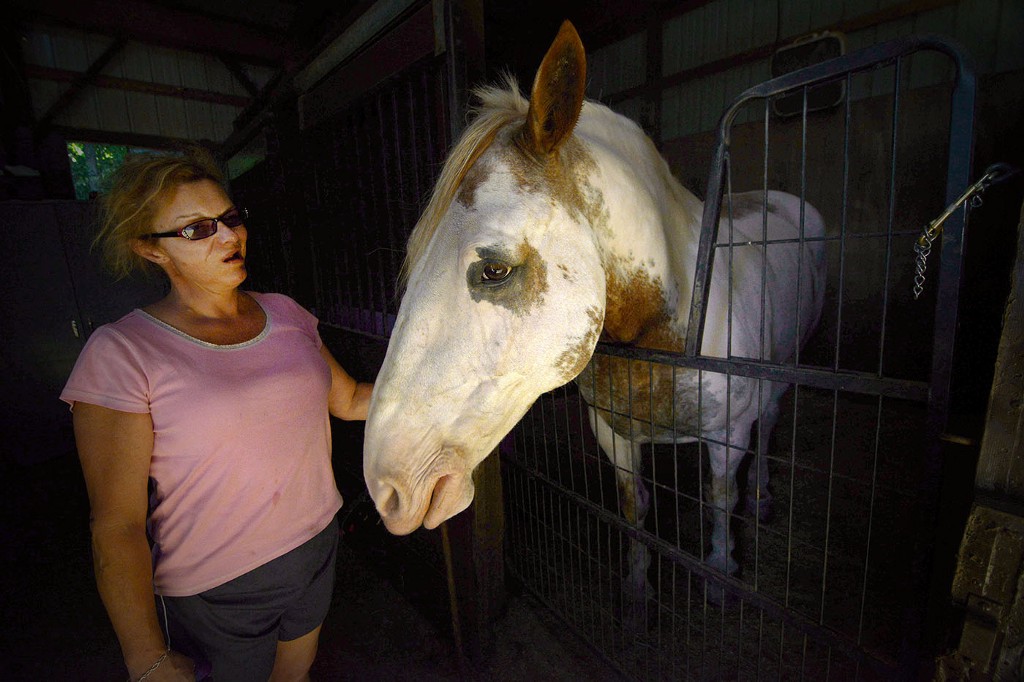
Horse owner Cathy McCullough and her horse, King Arthur, prepare for a ride at the Parkwood Therapeutic Riding Center, which uses horse riding as a meditative therapy. McCullough has allowed the program to use King Arthur for rides. MARIA POUCHNIKOVA / TIMES PHOTO
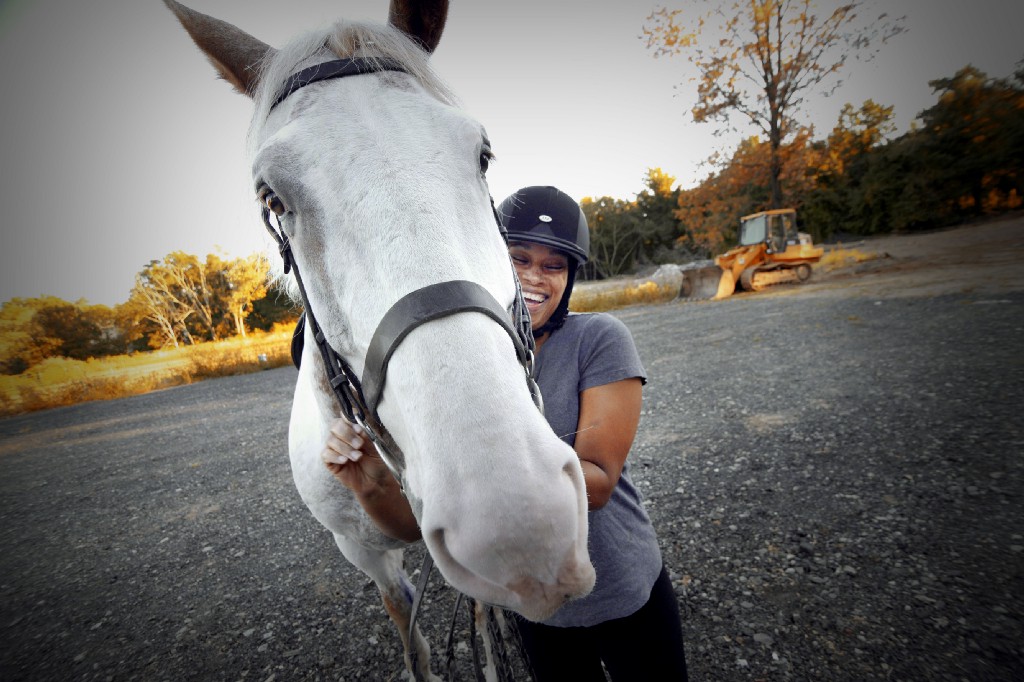
Rider Lisa Arnold also takes lessons at the Parkwood Therapeutic Riding Center. Here, she is pictured with King Arthur. MARIA POUCHNIKOVA / TIMES PHOTO
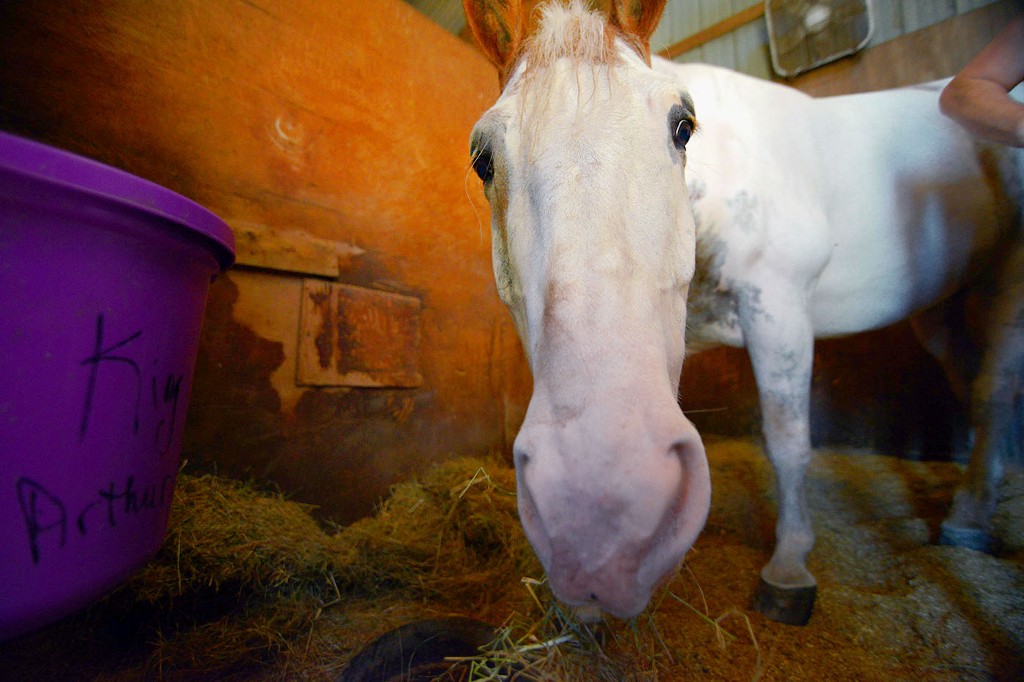
King Arthur, the biggest horse in the therapy program, eats hay and rests in between rides. MARIA POUCHNIKOVA / TIMES PHOTO
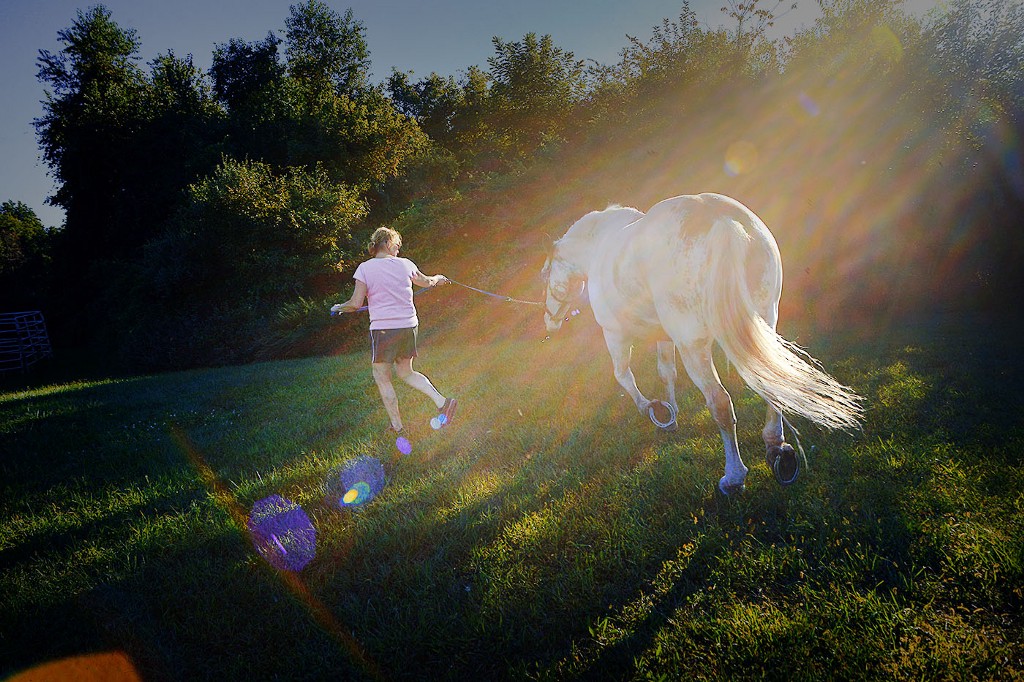
Cathy McCullough runs alongside King Arthur. MARIA POUCHNIKOVA / TIMES PHOTO
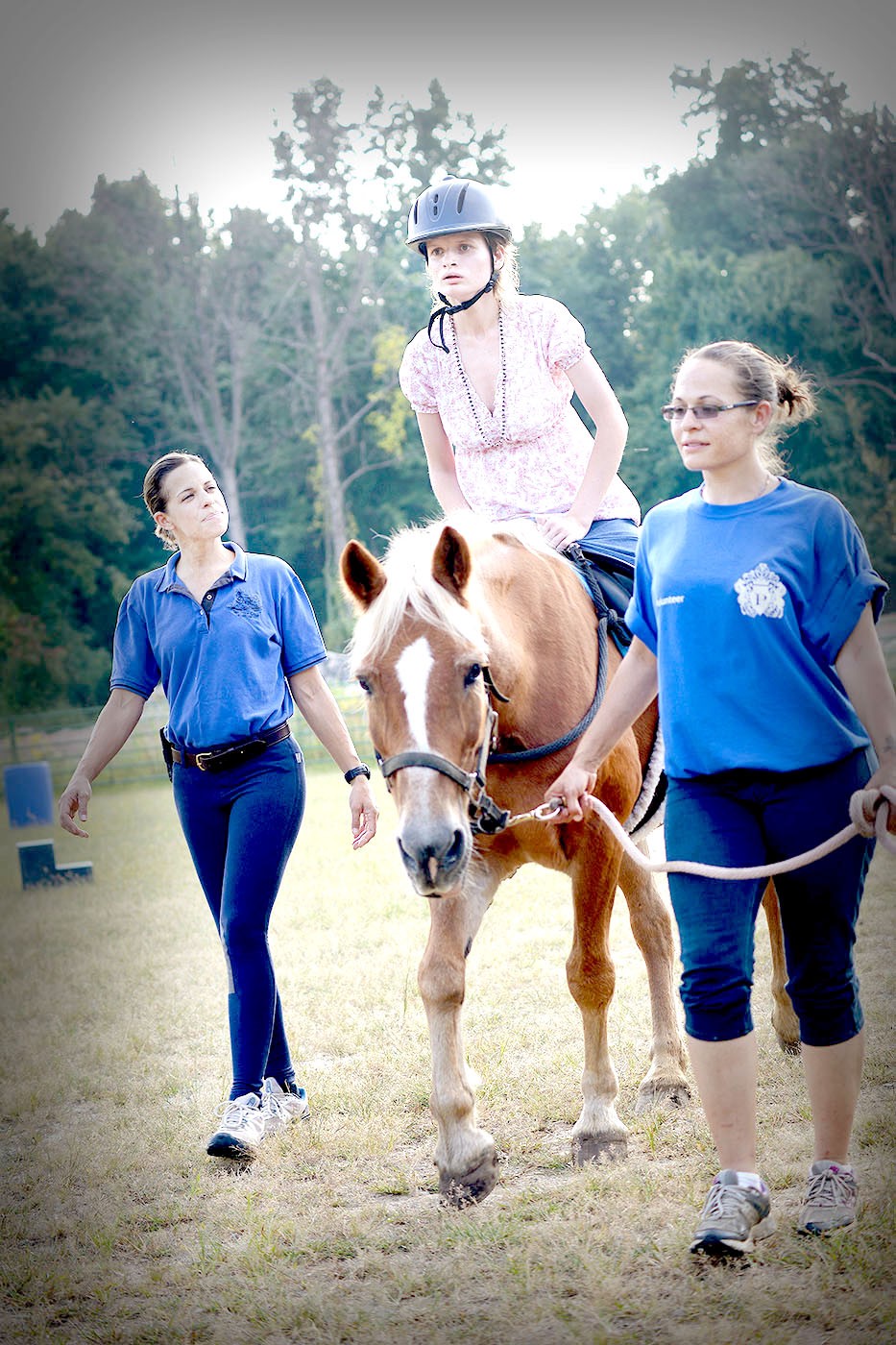
Sarah Del Ricci (left) and her sister Danielle Bacskay (right) help Nika (center) steer the pony, Isabella, during a riding lesson. MARIA POUCHNIKOVA / TIMES PHOTO
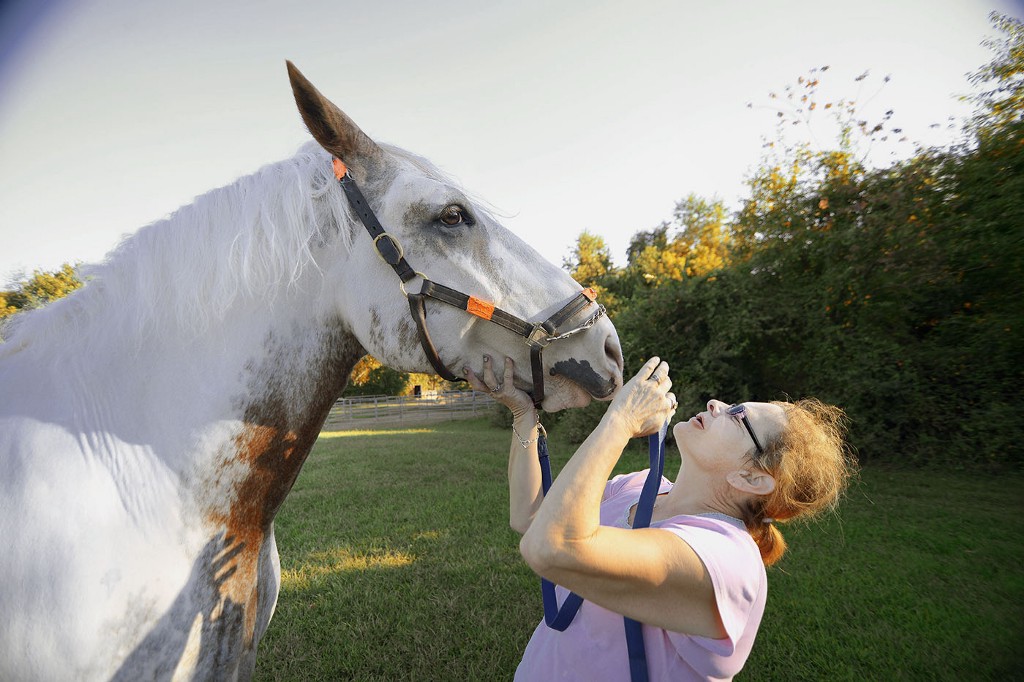
Back in the saddle: At top, left, the right side of Cathy McCullough’s face was paralyzed after surgery, which saved her life from a cancerous tumor. She bought King Arthur, an 800-pound horse that had some behavior problems. Together, over the years, the two have helped one another grow stronger mentally and physically. MARIA POUCHNIKOVA / TIMES PHOTO



